
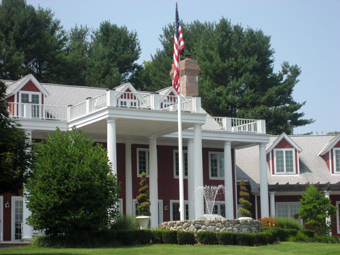
Black Star Farms operates a winery (with wines under the Arcturos and Leorie Vineyard label), a distillery, a fresh produce farm, horse stables and a B&B Inn. There's a creamery on the property as well.
Black Star Farms:
Wine Agritourism Grows Up
I tell everyone who will listen: don’t get into the wine business unless you’ve got a wow factor. ~ Don Coe, Black Star Farms Managing Partner
by
Eleanor & Ray Heald
February 27, 2008
Eleanor & Ray Heald (ERH): Why did you decide to establish a winery in Michigan when you could have done it anywhere in the U.S.?
Don Coe (DC): All our advertising says “an agricultural destination.” I knew that’s what I wanted to create. I knew northern Michigan well and considered it the perfect place.
Lee Lutes (LL): Perhaps Don could have gone anywhere to develop his idea. My goal, however, is to give Black Star Farms the element of midwestern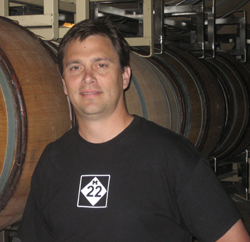
Black Star Farms winemaker Lee Lutes.hospitality wherever one is on the property. We’ve worked hard to remove any air of arrogance for our 70,000 tasting room visitors annually.
ERH: In the start-up years of Black Star Farms, most grapes were sourced from the Leelanau Peninsula AVA. Today however, the majority of Black Star Farms fruit originates from Old Mission Peninsula. Why and how does this relate to the new Black Star Farms winery there?
DC: In Bingham Township, which is our local township in Leelanau Peninsula, we’re only allowed to have a small winery, 25,000 cases, and we’re right up against it. Zoning is so restrictive.
LL: We couldn’t reasonably expand here and we had an issue with our partner growers’ fruit being so far away. We saw the results of that in 2005 with a warmer than normal vintage, difficulty keeping the grapes cool during transport to the Leelanau winery, and getting white grapes into the presses quickly.
This was also a smart business move. Typically, when tourists come to northern Michigan wineries, they visit one peninsula or the other. Now they have a chance to visit Black Star Farms Old Mission Peninsula. From a winemaking perspective, with two facilities, we have the opportunity to separate non-malolactic fermentation wines. Predominantly non-malolactic fermentation wines will be made at the Old Mission facility and barrel-fermented, malolactic wines and red wines at the Leelanau facility. This will push up the quality of all our wines.
ERH: What increase in case production is this going to give you?
LL: We are not looking to get much bigger. A second facility allows us to make better wines. A nice comfortable number for us is 25,000 to 30,000 cases, doing 12,000 to 15,000 out of each facility. On Old Mission, the size restriction is not a case limit but a maximum of 6,000 square feet for a winery.
ERH: Which varieties grow best on each peninsula?
LL: We don’t have sufficient history with the grape varieties grown in northwest Michigan. As much as people like to talk about the unique aspects of each peninsula, from a grape growing standpoint, I don’t believe there’s enough difference between the two that can be recognized in most wines. However, Northern Michigan has a soil mosaic. One vineyard has heavy clay with a loam overlay, yet right down the road the soil is beach sand. There’s enough soil variety on each vineyard site to impact varieties growing there.
For the most part, northwest Michigan’s vineyards are young and it’s difficult for us to say, at this point, which soil profile is best for a specific variety. As an example, I know that we grow good quality Pinot Blanc on both peninsulas.
We have a better idea of where to grow Riesling. From Kerm Campbell’s 40-acre, almost entirely gravel and sand vineyard at the end of Old Mission, as an example, Riesling is very fruitful, aromatic with a nice tinge of minerality. On a predominantly sandy soil profile, although there’s bright aromatics, there’s no mineral component. Heavier soils lend Riesling more body and a better mouthfeel.
ERH: Are most Black Star Farms visitors who book accommodations at the Inn from Michigan or elsewhere?
DC: Last year, we had Inn guests from 20 countries and 40 states. However, 90 percent of our guests were from Michigan, Indiana, Illinois and Ohio.
ERH: Although Black Star Farms is visible on wine labels, Arcturos is the brand name of the premium wines. Why did you choose this name?
DC: Arcturos is the brightest star in the constellation Boötes and the fourth-brightest star in the night sky.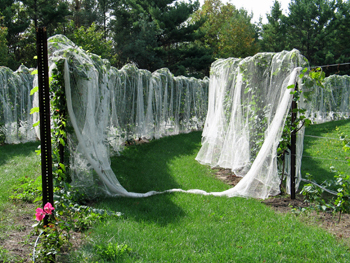
While Black Star Farms operates an inn, the winery does its best to keep the birds out with nets on the vines.Arcturos is a red giant about 28 times larger than the sun and 70 times more luminous, but it is 36 light years away from the sun. We also chose this name as a regional connection, using the Greek translation “guardian of the bear.” We’ve linked that to the Sleeping Bear Dunes on the Lake Michigan eastern shoreline.
ERH: Are there any issues holding back expansion of the Black Star Farms wine brands?
DC: Zoning restrictions have been our single biggest frustration. The county gate keepers view the fact that we grow, process, retail and market as commercial activities. The only part that they recognize as agriculture is growing, so they say that the land is zoned for agriculture. You can’t do the other activities because they don’t want them in their agricultural zones.
ERH: What has been the most helpful in growing the Black Star Farms wine brands? LL: We’ve had continuity from the get go. Having an active managing partner is essential to brand development. A winemaker can do a certain part of that but a managing partner keeps the focus for all personnel on what it is that we’re striving to do.
ERH: If we look forward five years, what changes do you envision for Black Star Farms and its wines?
LL: Changes that will be there are from a quality standpoint. I see the wines only getting better every vintage.
 ERH: What will bring that about?
ERH: What will bring that about?
LL: Older vineyards and more experience with each of those vineyards. It’s all about getting growers dialed in to consistently produce the quality of fruit needed for wines of excellence.
Photos by R
Don Coe (DC): All our advertising says “an agricultural destination.” I knew that’s what I wanted to create. I knew northern Michigan well and considered it the perfect place.
Lee Lutes (LL): Perhaps Don could have gone anywhere to develop his idea. My goal, however, is to give Black Star Farms the element of midwestern

Black Star Farms winemaker Lee Lutes.
ERH: In the start-up years of Black Star Farms, most grapes were sourced from the Leelanau Peninsula AVA. Today however, the majority of Black Star Farms fruit originates from Old Mission Peninsula. Why and how does this relate to the new Black Star Farms winery there?
DC: In Bingham Township, which is our local township in Leelanau Peninsula, we’re only allowed to have a small winery, 25,000 cases, and we’re right up against it. Zoning is so restrictive.
LL: We couldn’t reasonably expand here and we had an issue with our partner growers’ fruit being so far away. We saw the results of that in 2005 with a warmer than normal vintage, difficulty keeping the grapes cool during transport to the Leelanau winery, and getting white grapes into the presses quickly.
This was also a smart business move. Typically, when tourists come to northern Michigan wineries, they visit one peninsula or the other. Now they have a chance to visit Black Star Farms Old Mission Peninsula. From a winemaking perspective, with two facilities, we have the opportunity to separate non-malolactic fermentation wines. Predominantly non-malolactic fermentation wines will be made at the Old Mission facility and barrel-fermented, malolactic wines and red wines at the Leelanau facility. This will push up the quality of all our wines.
ERH: What increase in case production is this going to give you?
LL: We are not looking to get much bigger. A second facility allows us to make better wines. A nice comfortable number for us is 25,000 to 30,000 cases, doing 12,000 to 15,000 out of each facility. On Old Mission, the size restriction is not a case limit but a maximum of 6,000 square feet for a winery.
ERH: Which varieties grow best on each peninsula?
LL: We don’t have sufficient history with the grape varieties grown in northwest Michigan. As much as people like to talk about the unique aspects of each peninsula, from a grape growing standpoint, I don’t believe there’s enough difference between the two that can be recognized in most wines. However, Northern Michigan has a soil mosaic. One vineyard has heavy clay with a loam overlay, yet right down the road the soil is beach sand. There’s enough soil variety on each vineyard site to impact varieties growing there.
For the most part, northwest Michigan’s vineyards are young and it’s difficult for us to say, at this point, which soil profile is best for a specific variety. As an example, I know that we grow good quality Pinot Blanc on both peninsulas.
We have a better idea of where to grow Riesling. From Kerm Campbell’s 40-acre, almost entirely gravel and sand vineyard at the end of Old Mission, as an example, Riesling is very fruitful, aromatic with a nice tinge of minerality. On a predominantly sandy soil profile, although there’s bright aromatics, there’s no mineral component. Heavier soils lend Riesling more body and a better mouthfeel.
ERH: Are most Black Star Farms visitors who book accommodations at the Inn from Michigan or elsewhere?
DC: Last year, we had Inn guests from 20 countries and 40 states. However, 90 percent of our guests were from Michigan, Indiana, Illinois and Ohio.
ERH: Although Black Star Farms is visible on wine labels, Arcturos is the brand name of the premium wines. Why did you choose this name?
DC: Arcturos is the brightest star in the constellation Boötes and the fourth-brightest star in the night sky.

While Black Star Farms operates an inn, the winery does its best to keep the birds out with nets on the vines.
ERH: Are there any issues holding back expansion of the Black Star Farms wine brands?
DC: Zoning restrictions have been our single biggest frustration. The county gate keepers view the fact that we grow, process, retail and market as commercial activities. The only part that they recognize as agriculture is growing, so they say that the land is zoned for agriculture. You can’t do the other activities because they don’t want them in their agricultural zones.
ERH: What has been the most helpful in growing the Black Star Farms wine brands? LL: We’ve had continuity from the get go. Having an active managing partner is essential to brand development. A winemaker can do a certain part of that but a managing partner keeps the focus for all personnel on what it is that we’re striving to do.
ERH: If we look forward five years, what changes do you envision for Black Star Farms and its wines?
LL: Changes that will be there are from a quality standpoint. I see the wines only getting better every vintage.
 ERH: What will bring that about?
ERH: What will bring that about?
LL: Older vineyards and more experience with each of those vineyards. It’s all about getting growers dialed in to consistently produce the quality of fruit needed for wines of excellence.
Photos by R










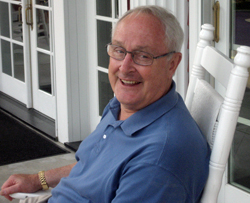
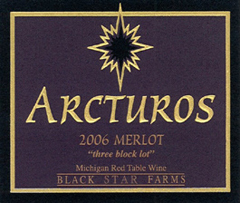
 READER FEEDBACK: To post your comments on this story,
READER FEEDBACK: To post your comments on this story,




